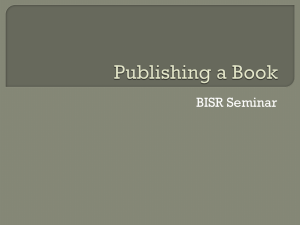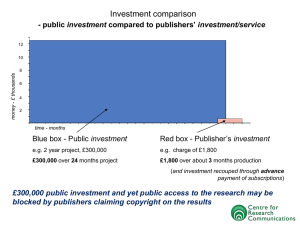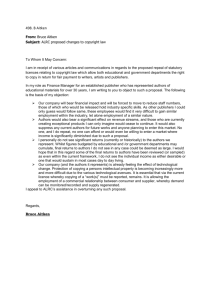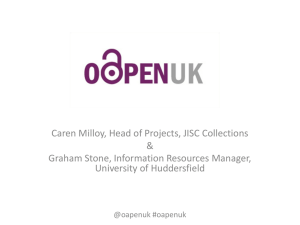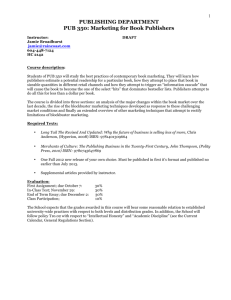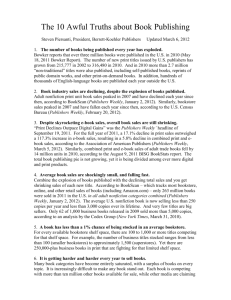Tasini Case Final Decision: Authors Win
advertisement
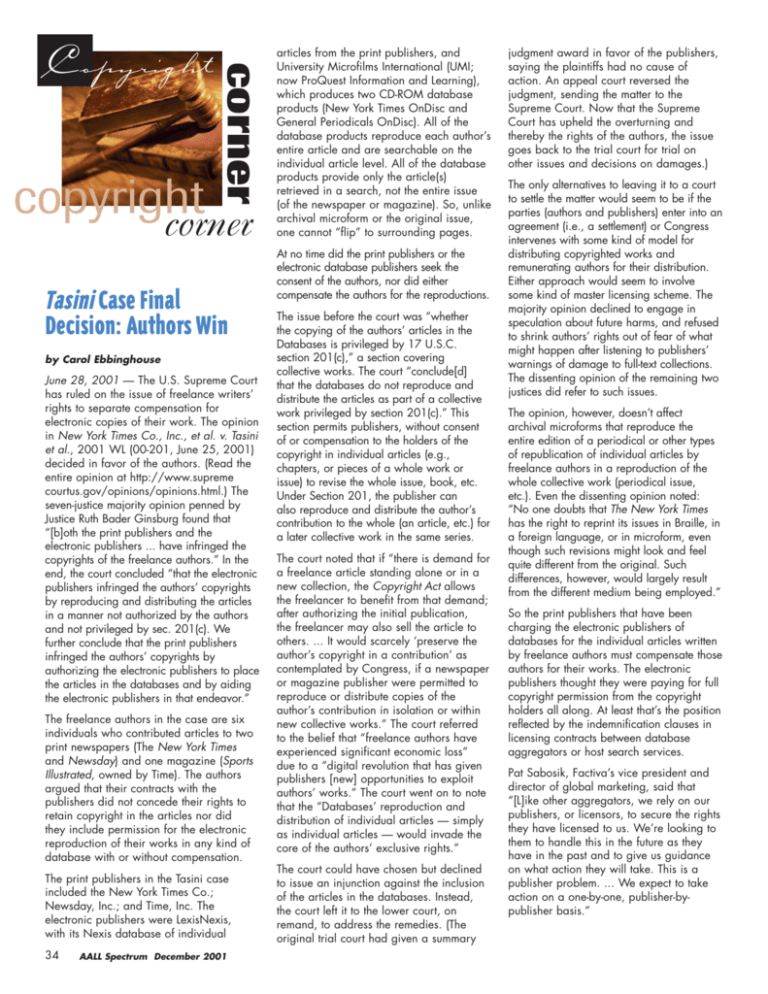
corner Copyright copyright corner Tasini Case Final Decision: Authors Win by Carol Ebbinghouse June 28, 2001 — The U.S. Supreme Court has ruled on the issue of freelance writers’ rights to separate compensation for electronic copies of their work. The opinion in New York Times Co., Inc., et al. v. Tasini et al., 2001 WL (00-201, June 25, 2001) decided in favor of the authors. (Read the entire opinion at http://www.supreme courtus.gov/opinions/opinions.html.) The seven-justice majority opinion penned by Justice Ruth Bader Ginsburg found that “[b]oth the print publishers and the electronic publishers ... have infringed the copyrights of the freelance authors.” In the end, the court concluded “that the electronic publishers infringed the authors’ copyrights by reproducing and distributing the articles in a manner not authorized by the authors and not privileged by sec. 201(c). We further conclude that the print publishers infringed the authors’ copyrights by authorizing the electronic publishers to place the articles in the databases and by aiding the electronic publishers in that endeavor.” The freelance authors in the case are six individuals who contributed articles to two print newspapers (The New York Times and Newsday) and one magazine (Sports Illustrated, owned by Time). The authors argued that their contracts with the publishers did not concede their rights to retain copyright in the articles nor did they include permission for the electronic reproduction of their works in any kind of database with or without compensation. The print publishers in the Tasini case included the New York Times Co.; Newsday, Inc.; and Time, Inc. The electronic publishers were LexisNexis, with its Nexis database of individual 34 AALL Spectrum December 2001 articles from the print publishers, and University Microfilms International (UMI; now ProQuest Information and Learning), which produces two CD-ROM database products (New York Times OnDisc and General Periodicals OnDisc). All of the database products reproduce each author’s entire article and are searchable on the individual article level. All of the database products provide only the article(s) retrieved in a search, not the entire issue (of the newspaper or magazine). So, unlike archival microform or the original issue, one cannot “flip” to surrounding pages. At no time did the print publishers or the electronic database publishers seek the consent of the authors, nor did either compensate the authors for the reproductions. The issue before the court was “whether the copying of the authors’ articles in the Databases is privileged by 17 U.S.C. section 201(c),” a section covering collective works. The court “conclude[d] that the databases do not reproduce and distribute the articles as part of a collective work privileged by section 201(c).” This section permits publishers, without consent of or compensation to the holders of the copyright in individual articles (e.g., chapters, or pieces of a whole work or issue) to revise the whole issue, book, etc. Under Section 201, the publisher can also reproduce and distribute the author’s contribution to the whole (an article, etc.) for a later collective work in the same series. The court noted that if “there is demand for a freelance article standing alone or in a new collection, the Copyright Act allows the freelancer to benefit from that demand; after authorizing the initial publication, the freelancer may also sell the article to others. ... It would scarcely ‘preserve the author’s copyright in a contribution’ as contemplated by Congress, if a newspaper or magazine publisher were permitted to reproduce or distribute copies of the author’s contribution in isolation or within new collective works.” The court referred to the belief that “freelance authors have experienced significant economic loss” due to a “digital revolution that has given publishers [new] opportunities to exploit authors’ works.” The court went on to note that the “Databases’ reproduction and distribution of individual articles — simply as individual articles — would invade the core of the authors’ exclusive rights.” The court could have chosen but declined to issue an injunction against the inclusion of the articles in the databases. Instead, the court left it to the lower court, on remand, to address the remedies. (The original trial court had given a summary judgment award in favor of the publishers, saying the plaintiffs had no cause of action. An appeal court reversed the judgment, sending the matter to the Supreme Court. Now that the Supreme Court has upheld the overturning and thereby the rights of the authors, the issue goes back to the trial court for trial on other issues and decisions on damages.) The only alternatives to leaving it to a court to settle the matter would seem to be if the parties (authors and publishers) enter into an agreement (i.e., a settlement) or Congress intervenes with some kind of model for distributing copyrighted works and remunerating authors for their distribution. Either approach would seem to involve some kind of master licensing scheme. The majority opinion declined to engage in speculation about future harms, and refused to shrink authors’ rights out of fear of what might happen after listening to publishers’ warnings of damage to full-text collections. The dissenting opinion of the remaining two justices did refer to such issues. The opinion, however, doesn’t affect archival microforms that reproduce the entire edition of a periodical or other types of republication of individual articles by freelance authors in a reproduction of the whole collective work (periodical issue, etc.). Even the dissenting opinion noted: “No one doubts that The New York Times has the right to reprint its issues in Braille, in a foreign language, or in microform, even though such revisions might look and feel quite different from the original. Such differences, however, would largely result from the different medium being employed.” So the print publishers that have been charging the electronic publishers of databases for the individual articles written by freelance authors must compensate those authors for their works. The electronic publishers thought they were paying for full copyright permission from the copyright holders all along. At least that’s the position reflected by the indemnification clauses in licensing contracts between database aggregators or host search services. Pat Sabosik, Factiva’s vice president and director of global marketing, said that “[L]ike other aggregators, we rely on our publishers, or licensors, to secure the rights they have licensed to us. We’re looking to them to handle this in the future as they have in the past and to give us guidance on what action they will take. This is a publisher problem. ... We expect to take action on a one-by-one, publisher-bypublisher basis.” Even the majority opinion, which followed the law, noted that the publishers “warn that a ruling for the authors will have ‘devastating’ consequences. ... A ruling for the authors, the publishers suggest, will punch gaping holes in the electronic record of history.” Justice John Paul Stevens, who wrote the dissenting opinion (with which only Justice Stephen Breyer concurred), noted that if “the problem is as important as amici contend, congressional action may ultimately be necessary to preserve present databases in their entirety. At the least, Congress can determine the nature and scope of the problem and fashion on (sic) appropriate licensing remedy far more easily than can courts.” On that issue, both opinions agree. Arthur Sulzberger Jr., chairman of the New York Times Co. and publisher of The New York Times, said: “The Times has lost this case and will now undertake the difficult and sad process of removing significant portions from its electronic historical archive. That is a loss for freelance writers because their articles will be removed from the historical record. Historians, scholars and the public lose because of the holes in history created.” Speculating about the future, Allen Paschal, Gale Group’s CEO, said: “A couple of things could happen: 1) the publishers and freelance writers could come to some sort of back-payment agreement and then track material going forward — that would mean working with us to get it done — 2) some have already threatened to expunge the unauthorized articles. ... I can’t comment on the legal rights or wrongs of the situation. ... I’m just worried about the cost and effort of cleaning the files up if Tasini leads publishers to pull articles out. I’d rather see publishers and authors reach an agreement, a financial settlement. Whichever side of the fence you fall on, that solution would be more practical.” Choicepoint pick up nov. pg.25 The National Writers’ Union (NWU) contends that publishers have already rebuffed an extended “olive branch.” According to the NWU, “We are dismayed that the response from some publishers to the Supreme Court’s ruling has been to quickly reject the olive branch we have extended. We have urged leaders of the media industry to sit down and negotiate a fair resolution, which would build on the comprehensive system the National Writers Union has already set up for compensating freelance writers for electronic re-uses of their work.” Jonathan Tasini, president of the NWU, said: “[I don’t] want to litigate forever. I am concerned as a writer and as a person in our society that information stays available. We just want fair compensation for writers.” He added, “This decision is not the ‘silver bullet.’ Other battles remain to be fought” (such as the Posner case, which seeks class certification for writers). Tasini thought the current decision should make that class-action suit approach much easier. (See the NWU Web page at http://www.nwu.org.) Michael Jacobs, vice president and general counsel of LexisNexis, pointed out that “the Supreme Court has the last word until Congress changes the law. We are going to seek congressional remedy. But in the meantime, this decision has clearly defined the rule we have to act on. At least now it’s clear. Businesses going forward can rely on the ruling and get rights in advance.” The question remains: If publishers try to go for the gold in Congress or wait for the trial court to decide matters on remand, rather than trying to voluntarily deal with author organizations if they can, what happens to the user? What data losses will we suffer while the jockeying for position continues? Carol Ebbinghouse (carole@wsulaw.edu) is library director at Western State University’s College of Law. Reprinted from Information Today 6/28/01, with permission. AALL Spectrum December 2001 35

